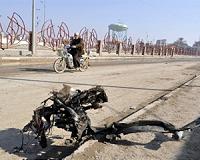| . |  |
. |
Kirkuk, Iraq (AFP) Jan 18, 2011 Iraq's northern Kirkuk province said it had stopped supplying electricity to the national grid on Tuesday, in a bold move to force the central government's hand in a dispute over power rationing. "Kirkuk province has decided to cut the power going out from its electricity stations to other provinces and to keep the power for the province until the ministry of electricity does something about our power cuts," provincial governor Abdulrahman Mustafa said Monday. Rizgar Ali, chairman of Kirkuk's provincial council, said the procedure of separating from the national grid was completed on Tuesday evening. He said that since the formation of a new government in Iraq on December 21, after more than a nine-month hiatus, nothing had been done about the electricity situation in Kirkuk. "Unfortunately, we didn't see any political step or intention from the government to help our people," he told AFP. National Deputy Electricity Minister Aamer al-Duri earlier described the cuts as "illegal" as he said a ministry delegation had been sent to Kirkuk on Tuesday to try to resolve the dispute. "Kirkuk is not the only province which suffers from power cuts," he told AFP. "It's the same for all provinces like Baghdad, Nineveh and others." Iraq's power supply remains drastically short of demand, with homes and businesses nationwide suffering daily cuts and relying on generators to fill the gap, as the war-ravaged country struggles to boost capacity. Kirkuk's provincial council threatened last summer to cut itself from the grid, calling on the ministry of electricity to increase the province's electricity allotment from 180 megawatts to at least 300 megawatts. The province's three power stations produce about 500 megawatts of electricity, with the majority of that being sent to Baghdad, Salaheddin and Dohuk provinces. "It is like a camel that carries gold but eats only roots," said Mohammed Khalil al-Juburi, a member of Kirkuk provincial council, comparing what the province was supplying to what it was receiving in return. Yaljin Mehdi, the head of electricity distribution for the province, said the decision to cut off from the national grid would result in Kirkuk receiving all 500 megawatts produced internally. Iraq's electricity demand totals around 15,000 megawatts, compared with total supply of 7,000 megawatts -- 6,000 megawatts produced locally, and 1,000 megawatts imported. A senior US embassy official said on Monday that for Iraq a "big challenge going forward is the race to provide infrastructure and services to the populace and keep pace with expectations." "We know come next summer, there's still not going to be enough megawatts online to provide 24-hour electricity -- it's just not in the cards," he said at a briefing for foreign press, speaking on condition of anonymity. "We saw riots last summer... that's a concern." Angry Iraqis staged violent demonstrations last summer in several southern cities over power rationing as temperatures reached 54 degrees Celsius (130 degrees Fahrenheit). Prime Minister Nuri al-Maliki, whose electricity minister resigned following those protests, warned in June that two more years of shortages lay ahead as there was no quick fix to the problem. Iraq's infrastructure was devastated during the 2003 US-led invasion and more than a decade of sanctions that preceded it.
Share This Article With Planet Earth
Related Links Iraq: The first technology war of the 21st century
 Suicide bomber wounds nine, misses Iraqi governor
Suicide bomber wounds nine, misses Iraqi governorRamadi, Iraq (AFP) Jan 17, 2011 A suicide bomber blew up his explosives-laden car in a convoy carrying the governor of Iraq's western Anbar province on Monday, wounding three bodyguards and six policemen, officials said. The governor was unharmed in the attack, the second in little more than a year to target Qassim Mohammed Abid. Abid, who was elected to office in January 2009, lost his left hand in a suicide attack in ... read more |
|
| The content herein, unless otherwise known to be public domain, are Copyright 1995-2010 - SpaceDaily. AFP and UPI Wire Stories are copyright Agence France-Presse and United Press International. ESA Portal Reports are copyright European Space Agency. All NASA sourced material is public domain. Additional copyrights may apply in whole or part to other bona fide parties. Advertising does not imply endorsement,agreement or approval of any opinions, statements or information provided by SpaceDaily on any Web page published or hosted by SpaceDaily. Privacy Statement |